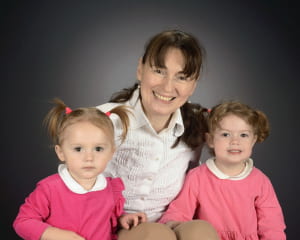One moment, Natalia Marandiuc might be grappling with a nuanced new idea relating to feminist soteriology. The next, she might be trying to explain to her toddler Anna why she can’t celebrate her second birthday, despite her strong insistence. (Anna is three.)
That’s Marandiuc’s life in a nutshell.
“I live a life of scholarly work, and parenting, and trying to integrate the two the best I can,” she said.
Marandiuc’s passion is the life of the mind. Born in Romania, her parents were intellectuals – her father is a historian and writer, her mother worked in epidemiology – and the family home had a large library of world classics.
“While we were very poor materially, we had a rich intellectual life,” Marandiuc said.

The research scholar is currently writing her second monograph, provisionally titled Love and Human Thriving: A Feminist Soteriology. “The book argues that human thriving inheres in experiences of human love that both mediate divine love and participate in God’s salvific work, and includes both a personal dimension and a communal facet, thus bringing together subjective fulfillment and transformative social justice,” Marandiuc said. She draws on feminist and womanist scholarship, gender theory and existentialist theology, as well as research in neuroscience. Among others, she engages the writings of Keller, Tanner, Butler, Williams, Aquinas, Rahner, and Kierkegaard.
“I am proposing that Spirit-infused love lies at the heart of soteriology and empowers resistance to the malaise that menaces human wellbeing and cultivates structures of injustice where women are core intersectional sites of such harm,” she said. She hopes to finish the book in the next two years and is in conversation with a religion editor, who expressed interest in publishing the work.
That will follow her first book, The Goodness of Home: Human and Divine Love and the Making of the Self (Oxford University Press, 2018), a constructive feminist argument for the becoming of human subjectivity through the confluence of human and divine love, which constitutes the self and enables its freedom. That monograph received the 2018 Aldersgate Prize.

When she is not engaged in her research, Marandiuc’s time is largely occupied by her two daughters. “The girls are a delight,” she said. “They are lovely in every way and are becoming exceptionally verbal. Both have very strong wills, full personalities, and expressive emotions.” It is a balancing act, but one that Marandiuc enjoys. “I have had good mentors who have integrated their family lives with academic careers very well,” she said.
To keep herself grounded, Marandiuc spends some of her time in contemplation. She looks back over her life and her wide-ranging immigrant journey – starting as an undergraduate at the University of Bucharest, then transferring to a school in the U.S., eventually earning her Ph.D. at Yale University, and now teaching and working at Perkins. “I like to take time to think and let myself feel whatever emotions come as I process life events,” she said. “Having had my life unfolding on two continents for a long time and coming from a rather atypical family of origin, I have had a very full life for many years now. I like to try to have a sense of the whole of it because there have been many different layers and pieces.”
Research Interests
Feminist constructive and systematic theology. Drawing on interdisciplinary sources in theology, religion, humanities, social sciences and neuroscience, Marandiuc’s research engages in a feminist register questions related to gendered subjectivity, theological anthropology, soteriology, Christology, and migration. The topic of love, both the love of God and love as a human experience, is a central thread in her research.
Books on Her Nightstand
There is a big pile, ranging from a couple of critical interpretations of Kierkegaard, to a book on how to speak to preschoolers about faith and sex, to some poetry books in Romanian. “I read very broadly,” she says.
Fantasy Dinner Party
Marandiuc would host a large party with a good number of other living theologians and scholars of religion from around the world. “I would love to have them all together in one room for a wonderful dinner along with their kids and their partners,” she said. “It would enrich our intellectual bonds with laughter, breaking bread, sharing a meal. I love to be in the kind of intellectual communities that expand so as to become networks of life.”
Family
Husband Joseph and two lively daughters: Anna, 3, and Julia, 2.
Hobbies
Marandiuc loves dramatic theatre. “I once scheduled a stopover in London just to see a particular rendition of Hamlet with Benedict Cumberbatch,” she said.
Favorite Travel Destination
Paris and London. “London is my second home,” she said. “I lived there for half a year, and I stop in London often when I travel to Romania.”
Something About Her Most People Don’t Know
Marandiuc has a degree in economics and worked for a year as an economist, as the junior member of the executive team of a global financial holding company. “That was an extraordinary experience that gave me the tools to critique market-driven capitalism as a theologian,” she said.
Question She’d Ask at the Pearly Gates
“The Pearly Gates are a metaphor that stands for what the Catholic tradition would call entering the communion of saints,” she said. “I think I would have a prayer more than a question. It would be an intercessory prayer of sorts, pleading with God to bring more justice in the world.”
